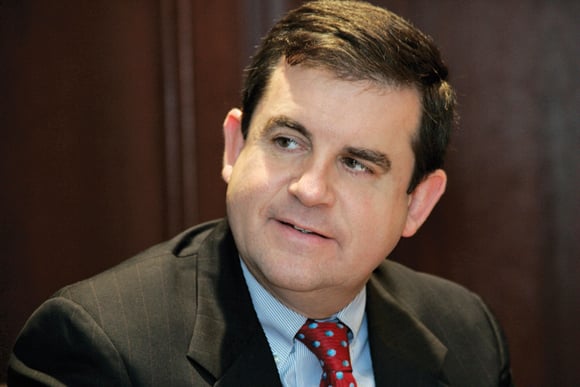Blackrock's chief equity strategist Bob Doll gave a not-so-ringing endorsement of the U.S. economy and the stock market for 2012.
Bob Doll, chief equity strategist for BlackRock Inc., gave a not-so-ringing endorsement of the U.S. economy and the stock market for 2012 in a conference call yesterday sponsored by asset management firm Envestnet Inc.
Mr. Doll expects GDP growth of between 2.0% and 2.5% this year and has a target of 1,350 for the S&P 500. Last year “was a frustrating year. Earnings were up 15%, P/E multiples were down 15% and the market went nowhere,” Mr. Doll said. “Don't get carried away with the recent good economic news. The U.S. economy will muddle through but it won't grow very rapidly.”
Along with fellow investment luminaries Milton Ezrati, senior economist and market strategist for Lord Abbett & Co. LLC, and Tony Crescenzi, market strategist and portfolio manager for Pacific Investment Management Co. LLC, who also participated on the call, Mr. Doll expects accommodative Federal Reserve policies to prop up a U.S. economy that is still in the process of deleveraging. His favorite growth sector is energy and favorite defensive sector is health care.
Mr. Ezrati was slightly more enthusiastic about stocks and bonds. “We've been struck by the superb value in equities and credit-sensitive fixed income,” he said. “We still see a lot of value there. We don't need a booming economy and we don't need Europe to solve all its problems and the [U.S.] government to fix the debt problem. We just need less fear about those issues.”
Mr. Crescenzi agreed with his colleagues that the deleveraging of the U.S. economy and stricter regulation of markets will keep a damper on economic growth. He described himself as “generally defensive and selectively offensive,” favoring high-quality corporate bonds of companies with exposure to growing markets. Mr. Crescenzi said he expected the outperformance of municipal bonds to continue this year.
U.S. Treasuries are near the end of the flight-to-quality-fueled run that started last year. All three men admitted surprise over the dramatic rise in Treasury prices last year, but they expect the safe haven aspect of T-bonds to be less of a draw for investors in the future. “We're in the final phase of a 30-year run in U.S. Treasuries,” Mr. Crescenzi said. “Central banks are looking to reflate their economies and we expect equities to be favored versus bonds.”
Europe and its problems, however, may still inspire stampedes into the safety of U.S. Treasuries. The three investment professionals agreed that Europe and its ongoing sovereign-debt crisis would remain the biggest wild card affecting global growth and the investment markets.
Mr. Mizrati said the growing involvement of the European Central Bank in the situation, and the fact that the “Germans realize they'll have to pay one way or another,” are positive developments. None of the experts, however, expected a comprehensive solution to the problem anytime soon.
“We don't see a resolution this year. In some sense, I don't think there is one when you have a unified monetary policy with disparate fiscal policies [of eurozone members],” Mr. Doll said. “The authorities will do as they've done in the last few months and advance the ball for a while. Europe will muddle through.”







